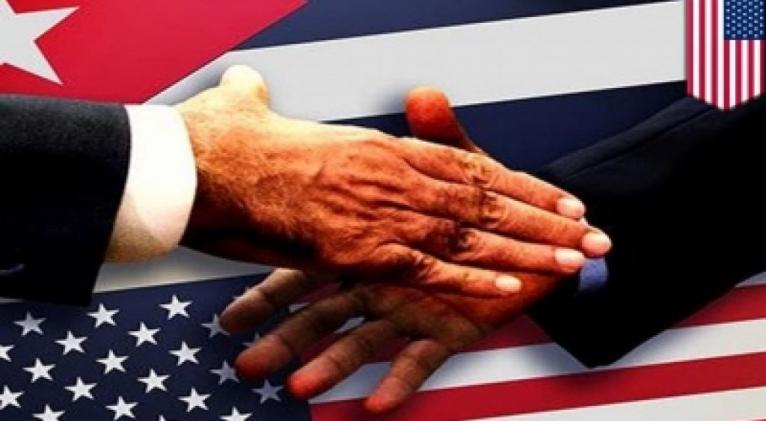The “normal” thing for Washington would be to order and Havana to obey
especiales

It happened what was supposed to happen; what was announced on December 17. That was a historic day; this Wednesday, the confirmation of the wills expressed by Raul Castro and Barack Obama. After 18 months of secret talks and 6 other of public rounds, Cuba and United States will re-establish diplomatic relations and open embassies in their respective capitals.
According to The New York Times, US Secretary of State John Kerry plans to come to Havana for the opening of their diplomatic mission next July 22.
After the euphoria generated by the long-awaited news, a question comes out: And now what? This re-establishment of diplomatic relations is both an arrival and starting point. In practical terms, it will favor the formalization of communication channels between both governments, which will enable them to continue negotiating pending issues.
On the other hand, it might lead to the opening of new consulates in both countries and this will facilitate the steps of the nearly 2 million Cuban-Americans living in U.S. and the Americans who would visit us, as well as future businesses.
In order to get an idea, between 1902 and 1961, there were 48 Cuban consular missions on US territory, nearly 30 of them remained open on January 1st, 1959, and 15 had consular rank. At present, with a much larger immigrant population than before, Cuba has only one consular office in Washington.
The opening of embassies does not open an easy road. It is necessary to see the behavior of US officials in Cuba, something that the Cuban government has warned Washington on more than once.
According to the Vienna Convention, which rules international diplomatic relations, the functions of a diplomatic mission consist of “representing the sending State before the receiving State; protecting in the receiving State the interests of the sending State and of its nationals, within the limits allowed by international law; negotiating with the government of the receiving State; getting to know by all lawful means conditions and development of events in the receiving State and reporting thereon the government of the sending State; encouraging friendly relations and developing economic, cultural and scientific relations between the sending State and the receiving State”.
So far, rounds of official talks had been aimed at restoring diplomatic relations. Now, other vital issues remain pending for Cuba, such as the lifting of the blockade, the return of the territory of the Guantanamo Naval Base, the cessation of the illegal broadcasts of Radio and TV Marti and the end of the programs originally designed to promote a “regime change”.
Likewise, other issues to negotiate are compensations for the human and economic damage caused by the blockade to the Cuban people, and on the American side, the payment for properties nationalized after the triumph of the Revolution in 1959.
Also, the technical talks that have been boosted after December 17 might gain a new momentum. They include, for example, migratory rounds, human rights, possible cooperation on health matters, confrontation with natural disasters and other issues.
As expected, not all politicians in Washington welcomed the news, notwithstanding that the public opinion in that country overwhelmingly supports the rapprochement. Marco Rubio, member on the Senate Foreign Relations Committee, has said he would block the appointment of a US ambassador to Havana. But in practice, that will not hinder the opening and operation of the embassy.
The Cuba issue has become part of the battlefield meant by US Congress. In parallel, lawmakers have submitted bills there trying to pave the way for bilateral relations and others that seek to block them.
We will need to keep track of each of those proposals, because that legislative body is the only one with authority to completely eliminate the blockade. After all, the moves adopted by Obama so far are executive ones and this means that, at least in theory, they can be reversed, though in practice, it’s unlikely that we return to a scenario prior to December 17.
Cuba has reiterated that the restoration of diplomatic relations and normalization of relations are two different processes. Now we can celebrate the first thing; but the latter is unlikely. Beyond that the word “normalization” is repeated again and again in political speeches on both sides of the Florida Strait, one would wonder whether U.S. has “normal” relations with someone. It has them neither with its ally Israel nor with big powers like Russia or China.
United States is a country with imperial mentality, and Cuba a small state in its closest area of influence. In that scenario, the “normal” thing for Washington would be to order and Havana to obey, and that’s not what the authorities of the island seek. In any case and realistically, it’s about achieving a peaceful coexistence among neighbors with respect for sovereignty, and cooperating in issues of common interest, in benefit of the two peoples and the world.
Cubasi Translation Staff













Add new comment